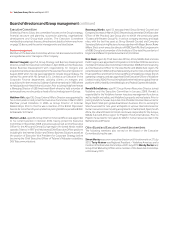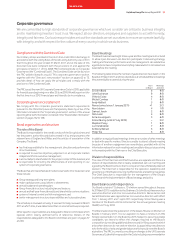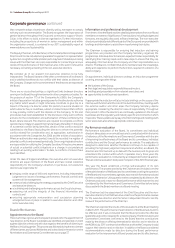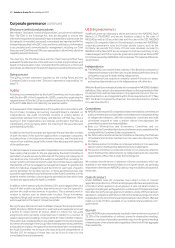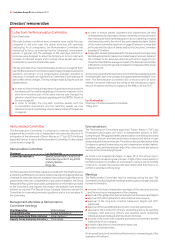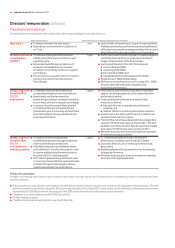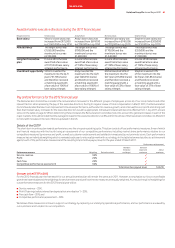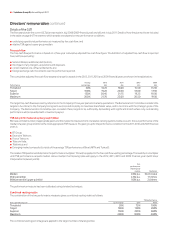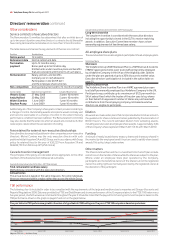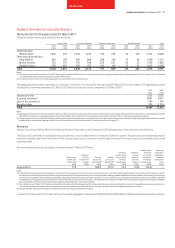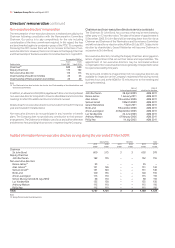Vodafone 2011 Annual Report Download - page 65
Download and view the complete annual report
Please find page 65 of the 2011 Vodafone annual report below. You can navigate through the pages in the report by either clicking on the pages listed below, or by using the keyword search tool below to find specific information within the annual report.
Vodafone Group Plc Annual Report 2011 63
Governance
Reward philosophy
The principles of reward, as well as the individual elements of the reward
package, are reviewed each year to ensure that they continue to support our
company strategy. These principles are set out below.
Competitive reward assessed on a total compensation basis
Vodafone wishes to provide a level of remuneration which attracts, retains
and motivates executive directors of the highest calibre. Within the package
there needs to be the opportunity for executive directors to achieve
significant upside for truly exceptional performance. The package provided
to the executive directors is reviewed annually on a total compensation
basis i.e. single elements of the package are not reviewed in isolation. When
the package is reviewed it is done so in the context of individual and
company performance, internal relativities, criticality of the individual to the
business, experience and the scarcity or otherwise of talent with the relevant
skill set.
The principal external comparator group (which is used for reference
purposes only) is made up of companies of similar size and complexity
to Vodafone, and is principally representative of the European top 25
companies and a few other select companies relevant to the sector. The
comparator group excludes any financial services companies. When
undertaking the benchmarking process the Remuneration Committee
makes assumptions that individuals will invest their own money into
the long-term incentive plan. This means that individuals will need to make
a significant investment in order to achieve the maximum payout.
Pay for performance
A high proportion of total reward will be awarded through short-term and
long-term performance related remuneration. The Remuneration
Committee believes that incorporating and setting appropriate performance
measures and targets in the package is paramount – this will be reflected in
an appropriate balance of operational and equity performance.
This is demonstrated in the charts below where we see that at target payout
over 70% of the package is delivered in the form of variable pay which rises
to almost 90% if maximum payout is achieved. Fixed pay comprises base
salary and pension contributions, while variable pay comprises the annual
bonus and the long-term incentive opportunity assuming maximum
co-investment and no movement in current share price.
Alignment to shareholder interests
Chief executive
Target
Maximum
Other executive directors(1)
Target
Maximum
Fixed Variable
Base Pension Bonus LTI
27.8% 72.2%
10.1% 89.9%
29.5% 70.5%
11.1% 88.9%
Note:
(1) Proportions for the directors other than the Chief Executive are the same.
Share ownership is a key cornerstone of our reward policy and is designed
to help maintain commitment over the long-term, and to ensure that the
interests of our senior management team are aligned with those of
shareholders. Executive directors are expected to build and maintain a
significant shareholding in Vodafone shares as follows:
■ Chief Executive – four times base salary; and
■ Other executive directors – three times base salary.
In all cases executives have been given five years to achieve these goals.
Current levels of ownership and the date by which the goal should be or was
required to be achieved are as shown below:
Goal as a
% of salary
Current %
of salary held(1)
Value of
shareholding
(£m)(1)
Date for goal
to be achieved
Vittorio Colao 400% 460% 4.9 July 2012
Andy Halford 300% 634% 4.4 July 2010
Michel Combes 300% 154% 1.2 June 2014
Stephen Pusey 300% 240% 1.3 June 2014
Note:
(1) Based on a share price at 31 March 2011 of 176.5 pence and includes net intrinsic value of any
option gains.
Collectively the Executive Committee including the executive directors own
8.7 million Vodafone shares, with a value of £15.2 million at 31 March 2011.
Alignment with shareholders is also achieved through the use of total
shareholder return (‘TSR’) measure in the Global Long-Term Incentive
(‘GLTI’) plan.
Incentive targets linked to business strategy
When designing our incentives, performance measures are chosen that
support our strategic objectives as shown below:
Strategic objectives Supported by
Focus on key areas of growth potential –
Aiming to deliver organic service revenue
growth of 1 – 4% a year until the year ended
31 March 2014 in five key areas: mobile data,
emerging markets, enterprise, total
communications and new services.
Revenue and relative
performance targets
in the Global Short-
Term Incentive Plan
(‘GSTIP’).
Delivering value and efficiency from scale –
Continuing to drive benefit from the Group’s
scale advantage and maintain our focus
on cost.
EBITDA, free cash
flow and relative
performance targets
in the GSTIP.
Generate liquidity or free cash flow from
non-controlled interests – Aim to seek to
maximise the value of non-controlled interests
through generating liquidity or increasing
free cash flow in order to fund profitable
investments and enhance shareholders returns.
The use of TSR as
a performance
measure in GLTI as
well as the value of
the underlying shares.
Apply rigorous capital discipline to investment
decisions – Continuing to apply capital
discipline to our investment decisions through
rigorous commercial analysis and demanding
investment criteria to ensure any investment
in existing businesses or acquisitions will
enhance value for shareholders.
Free cash flow targets
in both the GSTIP and
GLTI as well as the
TSR target in the GLTI.
Assessment of risk
In setting the balance between base salary, annual bonus and long-term
incentive levels, the Remuneration Committee has considered the risk
involved in the incentive schemes and is satisfied that the following design
elements mitigate the principal risks:
■ the heavy weighting on long-term incentives which reward sustained
performance;
■ the need for short-term incentive payouts to be used to purchase and
hold investment shares in order to fully participate in the long-term
arrangements; and
■ a considerable weighting on non-financial measures in the short-term
plan, which provides an external perspective on our performance
by focusing on customer satisfaction and performance relative to
our competitors.
The Remuneration Committee will continue to consider the risks involved
in the incentive plans on an ongoing basis.



